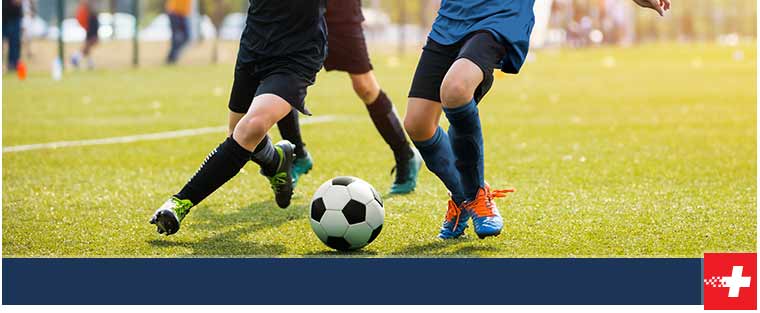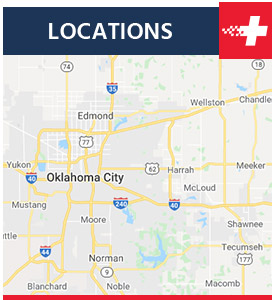Sports Physicals and Impact Concussion Testing Q&A
To determine the severity of injuries and how well a concussion has affected healing by comparing the behavioral and cognitive abilities before and after the injury. Sports physicals and impact concussion testing are helpful in the early detection and treatment of sports injuries, as well as in preventing sports injuries. Learn more about the benefits of sports physicals and how our team of healthcare professionals can help prevent and treat concussions. Sports physicals and impact concussion testing are available at Immediate Care of Oklahoma. For more information, contact us or schedule an appointment online. We have convenient locations near you to serve in Oklahoma City, OK.


Table of Contents:
What are the impacts of concussions in sports?
How should a sports-related concussion be evaluated?
What happens during impact testing?
What can be done to prevent or treat concussions?
Concussions in sports can lead to a range of physical, cognitive, and emotional symptoms. Physical symptoms may include headaches, dizziness, nausea, and balance problems. Cognitive symptoms may include difficulty concentrating, memory issues, and confusion. Emotional symptoms may include mood swings, irritability, and anxiety. These symptoms can impact an athlete’s ability to perform daily activities, including school or work, and may require medical attention for proper evaluation and management.
Concussions can also have long-term effects on an athlete’s health. Repeated concussions, or a history of multiple concussions, can increase the risk of developing chronic traumatic encephalopathy (CTE), a degenerative brain condition associated with memory loss, cognitive decline, and behavioral changes. This highlights the importance of proper diagnosis, management, and monitoring of concussions to mitigate potential long-term impacts on an athlete’s health.
A sports-related concussion should be thoroughly evaluated to ensure proper diagnosis and management. Evaluation of a concussion typically involves a comprehensive medical assessment that includes a detailed history, physical examination, and may also involve additional tests or imaging studies.
The history-taking component of the evaluation involves obtaining information about the athlete’s symptoms, the circumstances of the injury, any previous history of concussions, and any relevant medical conditions or medications. The physical examination may include assessing the athlete’s general neurological function, coordination, balance, vision, and hearing, as well as specific tests to assess cognitive function, such as memory and concentration.
In addition to the history and physical examination, additional tests or imaging studies may be ordered as part of the evaluation. These may include neurocognitive testing, which assesses cognitive function, balance testing, and imaging studies to rule out other possible injuries or complications.
Impact testing, also known as neurocognitive testing, is a type of assessment used in the evaluation of concussions and other traumatic brain injuries. It typically involves a computer-based test that measures an individual’s cognitive function, including their memory, reaction time, and processing speed.
During impact testing, the individual takes a series of tests that may involve tasks such as recalling words or symbols, reaction time tests, and cognitive processing tasks. These tests are typically administered using specialized software that presents the tasks on a computer or other electronic device, and the individual responds by selecting or inputting their answers.
The results of impact testing are compared to established norms for the individual’s age, sex, and other relevant factors to assess their cognitive function relative to their peers. Changes in cognitive function, such as declines in memory or reaction time, may indicate potential cognitive deficits associated with a concussion or other traumatic brain injury.
Concussions are traumatic brain injuries that can occur due to various causes, such as sports-related injuries, accidents, or falls. While they may not always be entirely preventable, there are several measures that can be taken to reduce the risk of concussions and provide proper treatment when they do occur.
Prevention of concussions begins with education and awareness. Athletes, coaches, parents, and healthcare professionals should be educated about the signs and symptoms of concussions, as well as the importance of reporting and properly managing head injuries. This includes implementing and enforcing rules and guidelines for safe play, such as using appropriate techniques and equipment, avoiding high-risk activities, and promoting sportsmanship.
Protective equipment, such as helmets, can also play a crucial role in preventing concussions. Wearing properly fitting and certified helmets during sports activities that pose a risk of head injury, such as football, hockey, or biking, can help absorb and distribute impact forces, reducing the risk of concussions.
Sports physicals and impact concussion testing are available at Immediate Care of Oklahoma. For more information, contact us or schedule an appointment online. We have convenient locations near you to serve in Oklahoma City, OK. We serve patients from Yukon OK, I-240 & Sooner RD OK, Norman (HealthPlex) OK, West Moore OK, Edmond OK, Norman (24th) OK, Tecumseh OK, Bethany OK, and surrounding areas.


Additional Services You May Need
▸ Urgent Care Services
▸ Illness + Injuries
▸ On Site Lab + X-Ray
▸ Helpful Health
▸ Motor Vehicle Accidents
▸ Drug Testing
▸ MRO
▸ UTI Treatment
▸ Employment Physicals
▸ Workers Comp
▸ Strep Throat Treatment
▸ Pregnancy Testing
▸ Blood Pressure Testing
▸ Urinalysis
▸ Mononucleosis Treatment
▸ Suture Removal
▸ Respiratory Syncytial Virus
▸ OccMed








